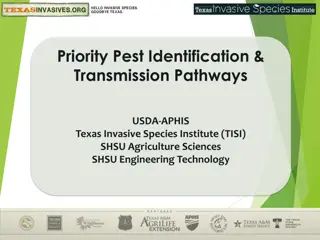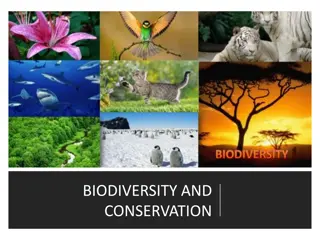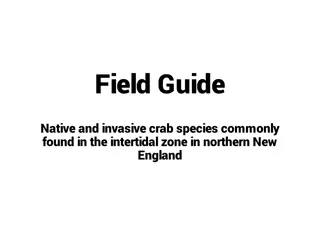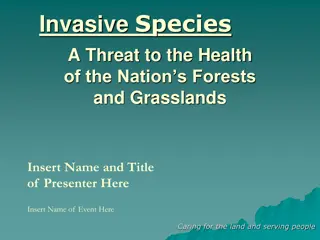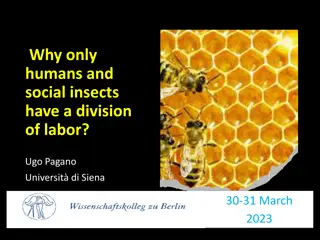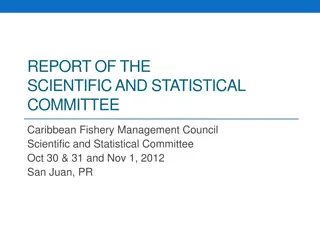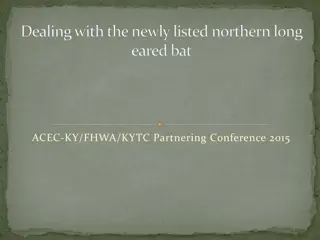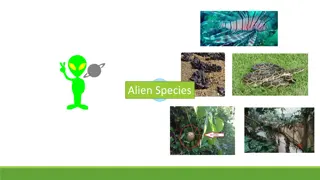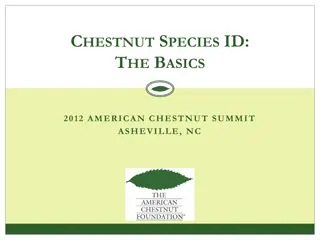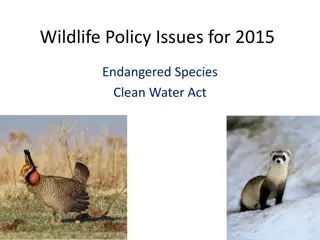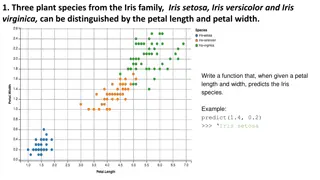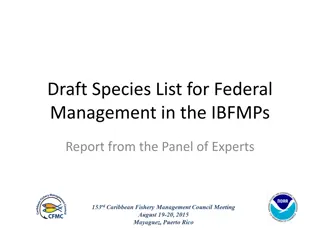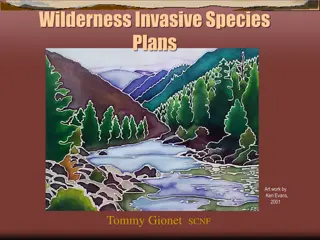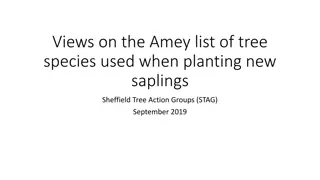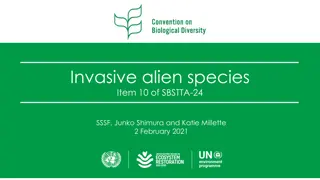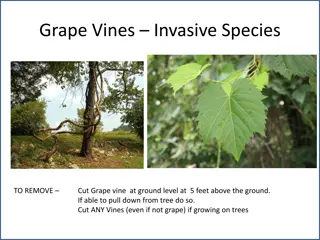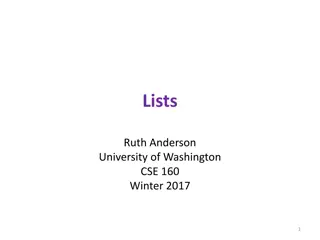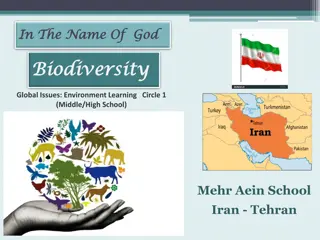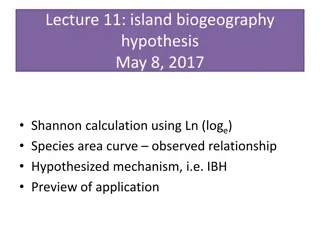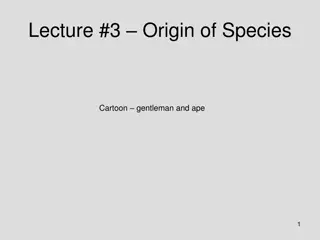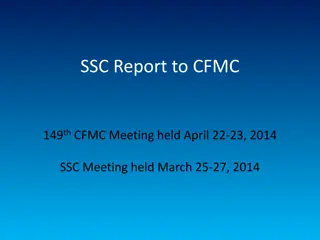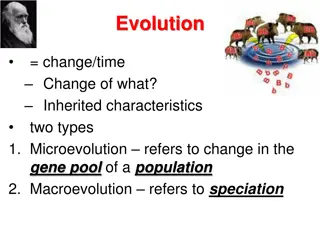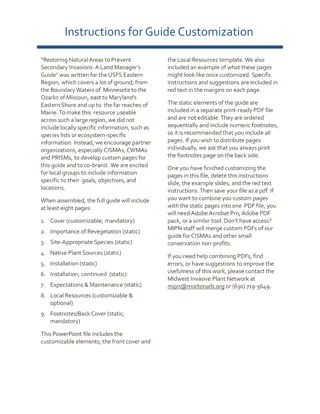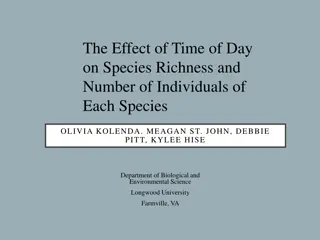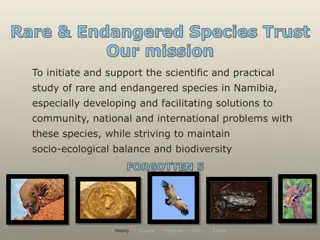Unlocking Opportunities Comprehensive Nursing Colleges Email List for Targeted Outreach
In the ever-evolving landscape of healthcare education, staying connected and informed is crucial for institutions aiming to provide quality nursing education. A Nursing Colleges Email List serves as a powerful tool for seamless communication, networking, and targeted outreach. This comprehensive li
5 views • 7 slides
Understanding Invasive Species Transmission Pathways
Explore the identification and transmission pathways of priority pests, focusing on the measures like plant pest analysis, survey enhancement, and rapid response capabilities for invasive species management. Delve into the critical role of human interactions in creating pathways for invasive species
2 views • 17 slides
Understanding Invasive Species in Northwest Michigan
Explore the impact of invasive species in Northwest Michigan through images and data on habitat support for butterfly and moth species, the transition of non-native plants to becoming native, and the definition of what makes a species invasive. Learn about the threats posed by non-native species and
4 views • 15 slides
DNC cast list popuplation in as per Ambasankar Commission .
Denotified Communities (DNC) refer to social and educationally Backward groups officially recognized and labelled as such by the Government under the Tamilnadu Backward community.DNC population Count as per the Ambasankar Commission report:Note: The Following are the Communities that are in the Cent
4 views • 5 slides
BC Caste population as per Ambasankar Commission in India
In India, the term \u201cBackward Classes\u201c(BC) refers to socially and educationally Backward groups. In India, they come to OBC at the National level.\nBC population Count as per Ambasankar Commission:\nNote: The Following are the Communities that are in the Central Government list of \u201cOBC
6 views • 5 slides
MBC Caste population as per Ambasankar Commission in India.
MBC in the Indian context typically refers to \u201cMost Backward Classes.\u201d This is a category used in some Indian states to identify communities that are considered socially and educationally Backward.\nMBC population Count as per Ambasankar Commission\nNote: The Following are the Communities
3 views • 5 slides
Malayalis in Forbes Richest List 2024
Forbes released its World's Billionaires List for the year 2024. American business magazine found an unprecedented 2,781 billionaires around the globe for this year\u2019s list with 141 more than in 2023 and 26 more than the previous record, set in 2021. 14 Malayalis made it into the list and their
32 views • 15 slides
Understanding Cladograms and Phylogenetic Analysis
Cladograms are used in cladistics to illustrate evolutionary relationships between organisms based on shared ancestral and derived characters. They are created by grouping species by common descent, forming clades that include an ancestral species and all its descendants. Valid clades are monophylet
0 views • 11 slides
Understanding Biodiversity and Conservation: Importance and Key Concepts
Biodiversity is the variety of life on Earth, encompassing all species and ecosystems. Conservation efforts are crucial to preserve genetic, species, and ecological diversity. The values of biodiversity range from productive and economic to social and aesthetic. Maintaining a balance in ecosystems,
4 views • 17 slides
Field Guide to Native and Invasive Crab Species in Northern New England Intertidal Zone
This field guide provides detailed information on native and invasive crab species commonly found in the intertidal zone in northern New England. It includes identification features and distinctions among the species, serving as a useful tool for conducting intertidal green crab quadrat surveys. The
0 views • 4 slides
Impacts of Climate Change on Ecosystems and Biodiversity in the United States
Climate change is significantly affecting species, populations, and ecosystems in the United States. Changes include alterations in the characteristics of organisms, shifts in biological event timing, and disruptions in geographic ranges. These impacts can lead to extinctions when species can't adap
0 views • 16 slides
College List Organization Workshop
Learn how to create a college list with this interactive workshop. Explore preferences, research colleges online, and list potential options for a good fit. Engage in reflective activities to tailor your list to your needs.
0 views • 14 slides
Managing Invasive Species to Safeguard our Forests
Invasive species pose a significant threat to the health of our nation's forests and grasslands, causing ecological, biological, and economic losses. This presentation highlights the impact of invasive species and underscores the importance of collaborative efforts to effectively combat this problem
2 views • 14 slides
Evolution of Division of Labor in Humans and Social Insects
Evolutionary advantages of cooperation and specialization led to a developed system of social cooperation and division of labor in humans and social insects. Despite vast differences, these species have conquered the earth due to common characteristics. The puzzle lies in why only a few species evol
0 views • 23 slides
Caribbean Fishery Management Council Scientific and Statistical Committee Report 2012
The Scientific and Statistical Committee (SSC) of the Caribbean Fishery Management Council reviewed species units with Annual Catch Limits (ACL) overages and discussed research priorities. When ACLs are exceeded, accountability measures are triggered, leading to a reduction in the fishing season. Th
1 views • 26 slides
Various Species of Honey Bees in Apiculture
There are over 20,000 species of wild bees, with honey bees being important for commercial apiculture. Four significant species reared are Apis dorsata (Rock bee), Apis florea (Little bee), Apis indica (Indian bee), and Apis mellifera (European bee). Each species has unique characteristics and yield
0 views • 10 slides
Understanding List Operations in Python
A comprehensive guide to list operations in Python, covering topics such as defining lists, performing functions on lists, indexing, slicing, and more. Learn about the basics of lists, initializing lists, updating elements within a list, deleting list elements, and common list operations like concat
0 views • 26 slides
Exploring the Northern Long-Eared Bat: Habitat, Range, and Conservation Status
Discover the fascinating world of the northern long-eared bat (NLEB) through insights on its range, appearance, habitat preferences, and conservation status. Learn about its roosting habits, distribution across states, and the challenges it faces as a threatened species. Delve into the complexities
0 views • 25 slides
The Impact of Invasive Species on Biodiversity and Ecosystems
The introduction of foreign species can have detrimental effects on biodiversity, ecosystems, and even humans. Invasive species like the Sea Lamprey and Burmese Python disrupt natural habitats, leading to a decline in biodiversity and posing risks to native species and human populations. However, th
0 views • 13 slides
Overview of Chestnut Species: American, European, Chinese, and Japanese Chestnuts
Important information about various chestnut species including American chestnut, European chestnut, Chinese chestnut, and Japanese chestnut is provided here. Details such as characteristics of leaves, twigs, buds, and growth patterns for each species are covered. Hybrid chestnuts and breeding effor
0 views • 16 slides
Wildlife Policy Issues for 2015: Endangered Species & Clean Water Act
Overview of policy issues surrounding endangered species and clean water act in 2015, including definitions, history, causes of endangerment, petition and listing factors. Focus on protecting species like the Lesser Prairie Chicken and Black-footed Ferret. Mention of Kansas' threatened and endangere
0 views • 21 slides
Helpful Functions for Iris Species Prediction and Dot Number Calculation
The provided content includes a function to predict Iris species based on petal length and width (Iris setosa, Iris versicolor, Iris virginica) and a function to calculate the number of dots in a figure pattern. The Iris prediction function uses specific criteria for each species, and the dot number
1 views • 6 slides
Draft Species List for Federal Management in IBFMPs Report
Panel of Experts was tasked with developing a draft list of species for federal management in Island-Based Fishery Management Plans (IBFMPs). Approaches outlined for selecting species include considering factors like species occurrence in State waters, stock status, ecological importance, and econom
0 views • 27 slides
Understanding the Impact of Invasive Species in Wilderness Management
Invasive species pose a significant threat to the ecosystem by causing disruptions in biodiversity and ecosystem health. This article discusses the importance of managing invasive species in wilderness areas and provides insights into creating successful Invasive Species Plans. It sheds light on the
0 views • 22 slides
Evaluating Tree Species Diversity for Planting in Sheffield: A Review of Amey's List
The article discusses the positive aspects and areas for improvement in the list of tree species used by Amey for planting new saplings in Sheffield. While the expanded list shows promise in enhancing variety and resilience, there are concerns about the wildlife value, canopy size, forward-thinking
0 views • 11 slides
Global Efforts in Managing Invasive Alien Species
Status reports on invasive alien species worldwide, including findings on successful eradications, regulations in various countries, and outcomes of online forums discussing technical guidance for managing invasive species under the CBD. Efforts include the development of tools, guidance, regulation
0 views • 10 slides
Invasive Plant Species Removal Guide
Learn how to effectively remove invasive plant species such as grape vines, garlic mustard, Japanese barberry, honeysuckle, and multiflora rose with detailed instructions and images for each species. Take necessary steps to remove these invasive species to protect native plant biodiversity.
0 views • 5 slides
Understanding Python Lists Operations
Python lists are versatile data structures that allow for efficient creation, querying, modification, insertion, removal, replacement, and rearrangement of elements. This comprehensive guide covers essential list operations such as extracting parts of a list, finding elements, and altering list cont
0 views • 18 slides
Understanding ADT List Operations and Implementations
In this detailed content, you will learn about the specifications and operations involved in working with an ADT list. The structure, domain operations, and user instructions are clearly outlined for efficient implementation. The content also delves into the representation and implementation aspects
0 views • 30 slides
Understanding List Comprehensions in Haskell Programming
In Haskell programming, list comprehensions provide a concise way to construct new lists from existing ones. By following comprehension notation similar to mathematics, you can generate sets and lists based on specified criteria. The order of generators and the use of dependent generators can signif
0 views • 22 slides
The Significance of Biodiversity in Ecosystems
Biodiversity plays a crucial role in boosting ecosystem productivity by ensuring each species contributes uniquely. Measuring biodiversity involves counting species in an area, with a higher species diversity indicating greater biodiversity. Despite this importance, an alarming number of species go
0 views • 17 slides
Island Biogeography Hypothesis and Species-Area Curves Overview
Explore the Island Biogeography Hypothesis through Shannon calculations and Species-Area Curve observed relationships. Learn about the mechanisms of island biodiversity, generalizations of species richness, and equilibrium concepts. Discover how area size influences species diversity and the impact
0 views • 24 slides
Hammerhead Worms: Invasive Species Identification and Overview
Invasive terrestrial flatworms known as Hammerhead Worms, including species like Bipalium spp. and Diversibipalium multilineatum, have been introduced to various regions, likely through soil or potted plants. Five invasive species have been identified, each with distinct characteristics and sizes. W
0 views • 9 slides
Understanding Species Concepts in Evolutionary Biology
Explore the various species concepts in evolutionary biology, including biological and morphological definitions, critical thinking on species boundaries, and the challenges of defining species based on reproductive isolation and morphological differences. Dive into key concepts like speciation, hum
0 views • 75 slides
Criteria for Species Inclusion in Fishery Management Plans
The report outlines criteria for species inclusion in island-based fishery management plans, covering national standards, stock management, and minimizing costs. It discusses key factors such as target stocks, ecosystem components, and economic importance. The suggested draft criteria include biolog
0 views • 17 slides
Understanding Evolution and Species Classification
Explore key concepts such as microevolution, macroevolution, species definition, population genetics, and the development of new species through variation over time. Learn about the importance of isolation in species formation, the hierarchical classification system, and the six kingdoms of life.
0 views • 24 slides
Northwest Michigan Invasive Species Network Overview
The Northwest Michigan Invasive Species Network (ISN) is a Cooperative Invasive Species Management Area dedicated to managing invasive species in northwest Michigan's natural areas. Founded in 2005 and funded through grants and private donations, ISN collaborates with over 60 partners to address inv
0 views • 5 slides
Understanding Biodiversity: Importance and Implications
Biodiversity encompasses the variety of plant and animal life on Earth, including genetic, species, and ecosystem diversity. It plays a crucial role in maintaining ecological balance and ecosystem processes. Traits and interactions among species influence ecosystem function, emphasizing the signific
0 views • 14 slides
Effect of Time of Day on Bird Species Richness and Individuals
The study investigates how the time of day impacts the species richness and number of individuals of birds at a specific feeder in Longwood University's Environmental Education Center. Through observational studies and counting, the researchers aim to determine if there are differences in bird popul
0 views • 20 slides
Rare & Endangered Species Trust: Protecting Namibia's Vultures and Pangolins
Rare & Endangered Species Trust in Namibia focuses on studying and supporting rare and endangered species, particularly vultures and pangolins. With a mission to find solutions to conservation challenges and maintain biodiversity, the trust highlights the history, crisis, and future prospects for th
0 views • 19 slides

